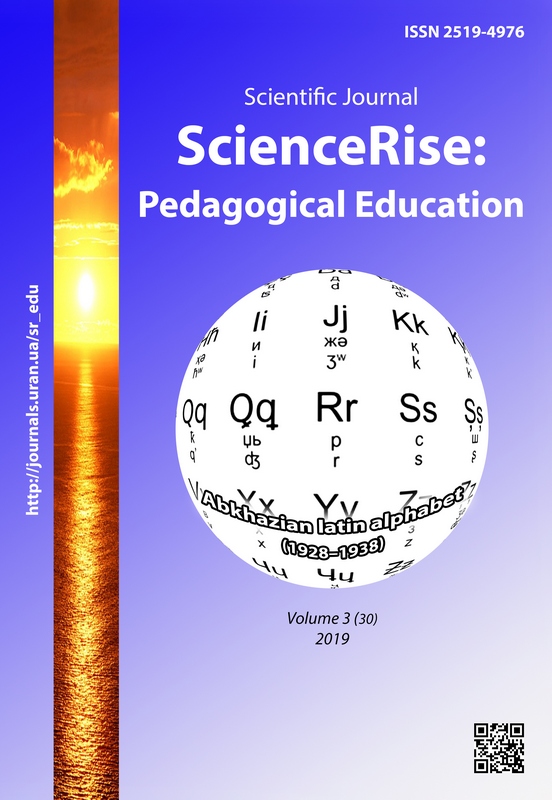Actual problems of the pedagogical mastership development of the musical art teacher under conditions of postgraduate pedagogical education
DOI:
https://doi.org/10.15587/2519-4984.2019.170645Keywords:
pedagogical mastership, teachers of musical art, postgraduate pedagogical education, forms of educationAbstract
The article is devoted to highlighting the current state of the development of pedagogical mastership of musical art teachers in the system of postgraduate pedagogical education. The modern experience of the development of pedagogical mastership in formal education is considered. The experience of using thematic, author's courses for teachers on the basis of special courses, master-classes, creative workshops, in-depth training, thematic training is described. The description of innovative forms of teacher training in the course period is given. The experience of the organization of non-formal education on the image problem is considered. the The most common forms of training teachers in non-formal education as scientific and pedagogical conferences, workshops, trainings, master-classes, round tables, problem-oriented theoretical and practical seminars, methodical meetings, schools of pedagogical skills, participation of teachers in creative groups associations are described.
The experience of organizing professional self-development of musical art teachers in the conditions of informal education, which are based on the basis of modern networked, electronic forms of self-study of teachers, is described. The necessity of preparing individual programs of development of pedagogical skills for the effective training of teachers has been determined. The results of the research in the system of postgraduate pedagogical education, which demonstrate priorities in the types and forms of education among teachers of musical art are described. The ways of introducing new forms of teaching on the development of pedagogical mastership of musical art teachers in the system of postgraduate pedagogical education are defined. Among the prospects for the development of pedagogical skills of teachers in postgraduate education, the substantive content of distant, network, e-learning of teachers, selection of effective learning technologies, formation of a bank of innovative forms and methods, the need to prepare scientific and methodological support for training musical art teachers in postgraduate pedagogical education are determined
References
- Semenova, A. V. (2016). Tsinnisnyi vymir dosvidu subiektiv pedahohichnoi dii. Odessa: Bondarenko M. O., 436.
- Nikitchenko, L. O., Shevchuk, O. A. (2016). Osnovy pedahohichnoi maisternosti: handbook. Vinnytsia: VDPU, 114.
- Kalinska, O., Sushentseva, L. (2017). The Development of Pedagogical Skills of the Teacher in the Modern Higher Education Institution. European Humanities Studies: State and Society, 4 (1), 80-96
- Lavrinenko, O. A. (2017). Pedahohichna maisternist – natsionalnyi fenomen Ukrainy. Formuvannia profesiino mobilnoho fakhivtsia: yevropeiskyi vymir. Lviv.
- Nychkalo, N. H. (2016). Kontseptsiia pedahohichnoi maisternosti akademika I. A. Ziaziuna: mizhdystsyplinarni zasady. Zhytomyr: Vyd-vo Ruta, 324.
- Dubrovina, I. V. (2016). Stymuliuvannia motyvatsii do samoosvitnoi diialnosti vchyteliv muzychnoho mystetstva v systemi pisliadyplomnoi osvity. Narodna osvita, 3, 42–48.
- Pavlyk, N. (2017). Teoriia i praktyka orhanizatsii neformalnoi osvity molodi. Zhytomyr: Vyd-vo ZhDU im. I. Franka, 162.
- Cedefop (2015). European guidelines for validating non-formaland informal learning. Luxembourg: Publications Office.Cedefop reference series. No. 104. Available at: http://doi.org/10.2801/008370
- Shpitsa, R. (2015). A phenomenon of artistic knowledge in the context of modern musical and pedagogical education. Intellectual Archive, 4 (6), 178–189.
- Shameem, Т. (2011). The Models of Teacher Education. Available at: http://tanvirdhaka.blogspot.com/2011/01/models-of-teacher-education.html
- Dixon, H., Ward, G. (2015). The Value of Masters Study to Teachers’ Professional Practice: Contradictory Discourses within the Workplace. Australian Journal of Teacher Education, 40 (2). doi: http://doi.org/10.14221/ajte.2015v40n2.4
- Buczynski, S., Hansen, C. B. (2010). Impact of professional development on teacher practice: Uncovering connections. Teaching and Teacher Education, 26 (3), 599–607. doi: http://doi.org/10.1016/j.tate.2009.09.006
- Overko, N. (2013). Rozvytok fakhovoi maisternosti pedahohiv profesiinoi shkoly u systemi pidvyshchennia kvalifikatsii. Pedahohika i psykholohiia profesiinoi osvity, 4, 172–180.
- Oliinyk, V. V. (2017). Vidkryta pisliadyplomna pedahohichna osvita: stan ta perspektyvy rozvytku. Pisliadyplomna osvita v Ukraini, 1, 3–11
- Proshkin, V. V. (2015). Pedahohichna systema yak predmet naukovoho doslidzhennia. Neperervna profesiina osvita: teoriia i praktyka, 4 (45), 7–12.
- Zakon Ukrainy «Pro osvitu» (2017). Verkhovna Rada Ukrainy No. 2145-VIII. 05.09.2017. Available at: https://zakon.rada.gov.ua/laws/card/2145-19
- Sydorenko, V. V. (2014). Pedahohichnyi kouchynh yak innovatsiina tekhnolohiia naukovometodychnoho suprovodu profesiino-osobystisnoho rozvytku vchytelia v systemi pisliadyplomnoi osvity. Naukova skarbnytsia osvity Donechchyny, 3 (14), 13–19.
- Dubrovina, I. V. (2016). Aktualni pytannia orhanizatsii samoosvitnoi diialnosti v systmi pisdliadyplomnoi pedahohichnoi osvity. Available at: https://int-konf.org/uk/2016/sotsium-nauka-kultura-18-20-01-2016/1202-dubrovina-i-v-aktualni-pitannya-organizatsiji-samoosvitnoji-diyalnosti-vchiteliv-muziki-v-sistemi-pislyadiplomnoji-osviti
- Vitvytska, S. S. (2015). Osnovy pedahohiky vyshchoi shkoly. Kyiv: Tsentr uchbovoi literatury, 384.
- Hodovaniuk, T. L., Tiahai, I. M. (2014). Formuvannia pedahohichnoi maisternosti u maibutnikh uchyteliv matematyky v pedahohichnomu universyteti. Science and Education a New Dimension. Pedagogy and Psychology, 2 (10 (20)), 62–65.
- Shcherbak, O.; Nychkalo, N. H. et. al. (Eds.) (2013). Pedahohichna maisternist u pidhotovtsi maibutnikh pedahohiv profesiinoho navchannia do profesiino-pedahohichnoi diialnosti. Pedahohichna maisternist akademika Ivana Ziaziuna. Kyiv: Bohdanova A. M., 465.
- Draft joint employment reportfrom the Commission and the Council accompanying the Communication from the Commission on the Annual Growth Survey 2017. European Commission. Available at: http://eur-lex.europa.eu/legal-content/EN/TXT/PDF/?uri=CELEX:52016DC0729&rid=1
- Non-formal adult education. Available at: http://www.eng.uvm.dk/adult-education-and-continuing-training/non-formal-adult-education
- Pedahohika vyshchoi shkoly. Available at: http://pidruchniki.com/18200205/pedagogika/zmist_struktura_komunikativnoyi_kulturi_pedagoga
Downloads
Published
How to Cite
Issue
Section
License
Copyright (c) 2019 Lyudmila Kondratova

This work is licensed under a Creative Commons Attribution 4.0 International License.
Our journal abides by the Creative Commons CC BY copyright rights and permissions for open access journals.
Authors, who are published in this journal, agree to the following conditions:
1. The authors reserve the right to authorship of the work and pass the first publication right of this work to the journal under the terms of a Creative Commons CC BY, which allows others to freely distribute the published research with the obligatory reference to the authors of the original work and the first publication of the work in this journal.
2. The authors have the right to conclude separate supplement agreements that relate to non-exclusive work distribution in the form in which it has been published by the journal (for example, to upload the work to the online storage of the journal or publish it as part of a monograph), provided that the reference to the first publication of the work in this journal is included.







